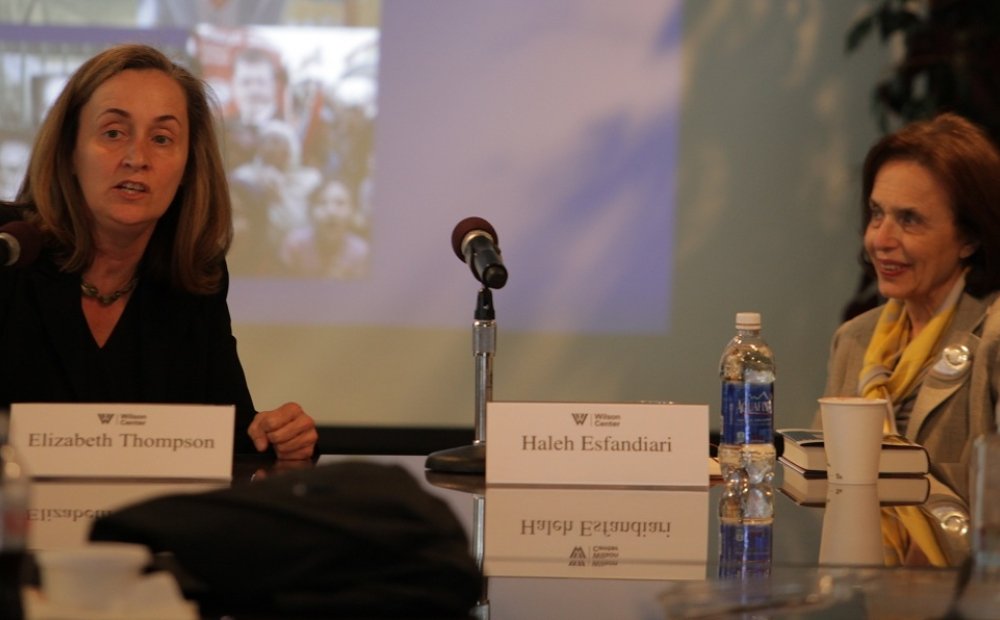Justice Interrupted: The Struggle for Constitutional Government in the Middle East

Elizabeth Thompson, former Fellow at the Woodrow Wilson Center and Associate Professor of History at the University of Virginia, discussed her latest book, Justice Interrupted: The Struggle for Constitutional Government in the Middle East, on the evolution of constitutional movements in the Middle East from the Ottoman Empire to the 2011 Arab revolutions.
On April 23, the Middle East Program at the Wilson Center hosted a book launch, Justice Interrupted: The Struggle for Constitutional Government in the Middle East, with Thompson. Haleh Esfandiari, Director of the Middle East Program at the Wilson Center, moderated the event.
Thompson said her book “is an attempt to humanize Middle Eastern history for the broader public” through a chronological account of constitutional movements from Turkey to Egypt, and from Iran to Lebanon. She said one of her purposes in writing the book was to show that the concepts of equality under the law and political representation are engrained in Middle Eastern politics, that “justice weights the same way in Middle Eastern cultures as in the West,” and to refute the assumption that “the East is condemned to oriental despotism.” Writing about the individual stories of constitutional movements’ leaders, Thompson sought to “understand the exact ideas these people fought for, what they risked their lives for by challenging monarchs.” Thompson noted that the 19th century Ottoman Empire citizenship laws, bill of rights, and rule of law were the beginnings of the constitutionalist movement in the Middle East. Although the movement failed, these innovative laws nevertheless advanced people’s rights in the Ottoman provinces and permeated politics with the concept of justice that is today’s “cornerstone of Middle Eastern politics.”
From the political opposition build-up following the Napoleonic invasion of 1798, to the leading role of Colonel Ahmed Orabi (the Egyptian nationalist who led the 1881-1882 revolts against the British monopoly of the Egyptian economy), Thompson evoked Egypt’s predominance in the struggle for rights, freedom, and justice. Orabi’s revolt, she added, empowered the historically underrepresented Egyptian peasants for the first time and even led to the formation of a parliament until the British occupied the country. She stressed the “pivotal moment at the end of World War I” at a time when the British and French were seizing power in former Ottoman territories and the 1919 “interrupted revolution in Egypt” of Saad Zaghloul against British colonialism. On Islamist politics, she pointed out that, in spite of his adherence to shari’a, the Muslim Brotherhood’s founder, Hassan al-Banna, never rejected the Egyptian constitution, and that justice is still advertised today by the Brotherhood as a strong political symbol.
Regarding the 2011 Egyptian revolution, Thompson said that while the people in Tahrir Square had a “romantic idea of the Egyptian constitutionalism of the 1930s and 1920s,” they rejected both the heritage of dictatorship and Nasserism. She added that protestors were galvanized by activists like Wael Ghonim who denounced police brutality and noted the Muslim Brotherhood’s help in organizing the protests. Egypt, and the Middle East in general, Thompson said, have “more than a century of commitment to constitutional ideals,” but these ideals have merged during the 20th century with “the vernacular language of Islam.” She emphasized that political conditions in the region, not culture, defeated past attempts to form constitutional governments.
By Valérie Guillamo, Middle East Program
Speaker

Professor of History, University of Virginia; Senior J.R. Fellow, U.S. Institute of Peace (2007-08)
Hosted By

Middle East Program
The Wilson Center’s Middle East Program serves as a crucial resource for the policymaking community and beyond, providing analyses and research that helps inform US foreign policymaking, stimulates public debate, and expands knowledge about issues in the wider Middle East and North Africa (MENA) region. Read more
